Vol 2 No. 42 TROPIC LIGHTNING NEWS October 23, 1967
Index
|
||
|
SLEEK AND DEADLY - The Army’s newest helicopter, the AH-1G Huey Cobra-fast, sleek and deadly. (Photo by LT A. R. Karel) |
Army’s “Cobra” To Strike Back
The Army’s newest helicopter - the AH-1G Huey Cobra - was introduced to the
25th Div last week when two of the aircraft were flown here from Bien Hoa for a
demonstration of their flight and weapons system capability.
LTC Paul Anderson heads a special volunteer team from the U.S. Army Aviation
Test Board at Fort Rucker, Ala., which is conducting in-country pilot training
with six of the new helicopters.
Vietnam delivery of the Huey Cobra is expected to begin later this year or
early 1968.
It was learned from Anderson that even though the aircraft incorporates the
same transmission, engine and rotor system as the older UH-1B model, pilots will
still have to go through an 18-hour transition period.
“We feel that with the difference in the agility, speed and armament system,
pilots will need the transition training,” Anderson explained. “They will
receive ten hours of gunnery training and eight hours of flight technique from
the front and rear seat.”
Two each of the helicopters will be used for flight, maintenance and armament
training.
The Cobras are armed with three 7.62 cal. mini-guns and two 2.75 rocket
pods. It was disclosed that later production models will have either two
grenade launchers or twin mini guns in a nose-mounted turret.
Full specifications were not announced, but Anderson stated that the cruising
speed of the new craft is equal to the maximum speed of the UH-1B model because
the fuselage is only 36 inches wide cutting air drag by one-third.
‘Manchus’ Capture Carbines
A recent sweep in the HoBo Woods 25 kms north of Trang Bang, netted the 4th
Bn, 9th Inf “Manchus,” 34 Chicom carbines.
Bravo Co was completing its part of the operation when third platoon’s point
man spotted a half-covered hole by the side of the trail, apparently exposed by
recent air or artillery strikes.
Investigating the hole, the Manchus uncovered a tunnel. Just inside the
entrance were two boxes containing the weapons. Only three had bolts in them,
but all were at least partially covered with Cosmoline and fairly
well-preserved. There was no estimate of how long the weapons had been there.
One of the boxes had disintegrated and the other one was stamped ‘1945’.
Lady’s Club Donates Clothing
The civic action programs being sponsored by various units in the 25th Div
are enjoying a large amount of help from the American people.
One such case was reported this week by SP4 David Hargrave, a combat
photographer with the 125th Sig Bn from Richmond, Calif.
An article appeared several months ago in the Richmond Independent which
disclosed the contents of a letter from Hargrave to his mother, Mrs. Bette
Hargrave. It described how his battalion had adopted the Vietnamese ward in the
12th Evac Hosp and how there was a great need for clothing.
In response to the article, a Richmond group called the Widows of World War I
headed by Mrs. Majorie Ford, started sending clothing.
“The first few boxes that arrived contained baby clothes,” says Hargrave,
“but gradually I started receiving adult sizes. I’ve gotten about 25 packages
so far, crammed full of clothing - some new and others used, but all in
excellent condition.
The response has been so great that the nurses have been able to give away
some of the clothing during MEDCAPS.”
Hargrave learned last week that the donors are planning to send Christmas
toys. “I’ll be rotating before Christmas,” Hargrave added, “but one of the
nurses will take over for me.”
Hargrave was referring to 1LT Phyllis Seaton, who has been working in the
Vietnamese ward since January.
“At first Mrs. Ford thought I was a one-man army,” says Hargrave jokingly,
“but I finally convinced her that the whole battalion is working on the
project. We’ve collected $700 so far just for the ward.”
It was learned that quite a few of the soldiers visit the ward during the
evening to give the patients cold soda, candy and chewing gum purchased by their
own money.
Mech Back From Kolekole
142 – Days In The Field
The 1st Bn (Mech), 5th Inf, recently returned to their Cu Chi base camp after
a record of 142 days of continuous mechanized combat. It was the first time
many of the soldiers had seen the 25th Inf Div base since May 13.
During the nearly five continuous months in the field, the battalion killed
56 Viet Cong and destroyed the largest ammunition manufacturing and cache area
ever uncovered by the Division.
May 13 was the beginning date of the 2d Bde’s Operation “Kolekole.” The Mech
was initially assigned to central Hau Nghia Province.
The area produced only light contact with enemy forces, and the battalion was
moved to the Loc Giang, an area long known for its heavy boobytrapping, 40 kms
northwest of Saigon.
Giant CH-47 “Chinook” helicopters flew C Btry of the 1st Bn, 8th Arty, into
position at the new base known as Diane.
Only days after the base was established, the mechanized battalion uncovered
and destroyed a huge Viet Cong base camp capable of sheltering an estimated
600-700 enemy soldiers. The camp lay alongside the monsoon flooded Oriental
River.
Soon after, in the same area, elements of the unit scouting a streambed
emptied at low tide found a cache of mortar rounds lying in the mud under
overhanging grass. At high tide the position was again flooded, this time minus
the ammunition.
The find triggered an inch-by-inch search that quickly proved the area to be
one vast ammunition storage and manufacturing area.
Underground workshops complete with drill presses, metal forming tools,
melting furnaces, and ammunition reloading materials were destroyed.
Most were found by infantrymen on hands and knees probing with knives,
bayonets and sharpened bamboo poles.
In all, more than 11,000 small arms rounds, 700 boobytraps, 570 Chinese
grenades, 135 mortar rounds, and ten 250 pound bombs were destroyed.
In addition to the ammunition and manufacturing facilities, the battalion
accounted for 56 enemy dead. Most of these were a result of the unit’s first
experience with heliborne operations since they arrived in Vietnam more than one
and one half years ago.
Night ambushes along the Oriental River also accounted for their share of the
total. Heavy weapons were frequently mounted on the riverbank to intercept
night Viet Cong river traffic. This, and search operations, accounted for
destruction of 62 enemy sampans.
During the 142 days, the mechanized troopers destroyed 733 enemy bunkers and
179 tunnels. Brigade officials credit the unit with dealing a major blow to
local and infiltrating Viet Cong units in the widespread Loc Giang area.
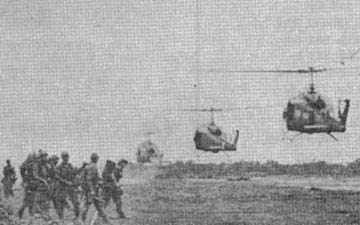 |
READY FOR EXTRACTION - Choppers set down to pick up elements of the 1st Bn (Mech), 5th Inf, for another combat assault along the Oriental River. (Photo by SGT Roger Smith) |
Abducted View Officials Escape
Two South Vietnamese government officials kidnapped by Viet Cong who overran
a small outpost, recently told how they spent two days chained and blindfolded
before escaping to a nearby 25th Inf Div unit.
They were abducted from an outpost near Trang Bang 34 kms northwest of Saigon
after it was attacked. They told 2d Bde officials a story of midnight escape
while shackled, and hot pursuit by their armed captors.
Running all night through thick jungle despite their chains, the two men
stumbled into the forward base camp of the 1st Bn, 27th Inf “Wolfhounds,”
shortly after dawn.
Knowing little English, they shouted “Chieu Hoi” to perimeter guards and held
their hands above their heads as if surrendering. The Vietnamese words are
usually used by rallying Viet Cong.
Once inside the perimeter they frantically told interpreters of the Viet Cong
force that had pursued them throughout the long night.
The battalion immediately deployed elements to sweep the escape route. As
they moved, helicopter gunships overhead spotted VC moving away from the ground
troops.
One Viet Cong was killed immediately by gunship fire and soon after one more
was killed and two wounded by the ships and ground elements.
Infantrymen captured two AK-47 automatic rifles and one Chinese carbine. The
wounded enemy soldiers were treated by battalion medics. As they began to treat
the more seriously wounded VC, he attempted to pull a grenade from his belt.
The man was subdued, bandaged and evacuated to a military hospital.
The two government officials, though exhausted, were unhurt, and were
returned to their unit at Trang Bang.
Page 2 TROPIC LIGHTNING NEWS October 23, 1967
Decorated
They that can give up essential liberty to obtain a little temporary safety
deserve neither liberty nor safety.
Benjamin Franklin
| BRONZE STAR (VALOR) | |
|
1LT John J. Ricca, Co A, 2d Bn, 14th Inf SP4 Kenneth L. Tate, Co A, 2d Bn, 14th Inf SP4 Richard P. Dawsey, HHC, 2d Bn, 27th Inf SP4 David L. Burton, HHC, 2d Bn, 27th Inf |
SP4 Ronald S. Summers, HHC, 2d Bn, 27th Inf SP4 William McDaniel, Co A, 2d Bn, 27th Inf SP4 Donald R. Glover, Co A, 2d Bn, 14th Inf |
ARMY COMMENDATION MEDAL (VALOR) |
|
|
SSG David G. Wilkinson, 25th Admin Co SP5 David A. Jones, Co B, 725th Maint Bn SP4 Franklin D. Howard, HH&S Btry, 3d Bn, 13 Arty |
PFC Darrel W. Porter, B Btry, 2d Bn, 77th Arty PFC Norbert J. Deichl, Co A, 2d Bn, 14th Inf PFC William Singleton, Co A, 1st Bn (Mech), 5th Inf |
ARMY COMMENDATION MEDAL (MERIT) |
|
|
CPT John C. House, B Btry, 6th Bn, 77th Arty CPT Earnest A, Levasseur, B Btry, 6th Bn, 77th Arty SP5 Alvin Griggs, Co E, 725th Maint Bn SGT Paul R. Micenic, HHC, 25th S&T Bn SGT Jerry L. Miller, HHC, 1st Bde SGT Thomas L. Pearson, Co B, 1st Bn (Mech) 5th Inf SP5 Larry L. Billeter, Co C, 725th Maint Bn SGT Richard E. Chapman, D Trp, 3d Sqdn, 4th Cav SGT Willie T. Moorman, Co A, 125th Sig Bn SGT Benson R. Bell, HHC, 2d Bn, 12th Inf SP5 Raymond Martinez, C Btry, 2d Bn, 77th Arty SP5 Ronald Conrad, B Btry, 2d Bn, 77th Arty SGT Jerr L. Cope, C Btry, 1st Bn, 8th Arty SP5 John R. Futhey, Co C, 725th Maint Co SP5 Clark B. Lohr, 25th Admin Co SP5 Gary W. Krahl, HHB, 25th Inf Div Arty SGT James Cloudeagle, HHC, 4th Bn (Mech) 23d Inf |
SGT Gerald H. Toppen, HHC, 3d Bde SGT Forest A. Pitre, C Btry, 2d Bn, 77th Arty SGT Robert J. Birk, HHC, 2d Bn, 12th Inf SP5 John B. Schrage, Co B, 3d Bn, 22d Inf SP4 Alston H. Gabriel, Co B, 725th Maint Co SP4 Patrick R. Leintz, HHC, 25th S&T Bn SP4 Miguel Pagan, HHC, 4th Bn (Mech), 23d Inf SP4 Therman K, Roberts, HHC, 25th S&T Bn SP4 Jewel E. Sanford Jr., HHC, 25th S&T Bn SP4 Van D. Karg, Co C, 2d Bn (Mech), 22d Inf SP4 William B. Smith, C Btry, 2d Bn, 77th Arty SP4 Melvin C. Johnson, HHD, 125th Sig Bn SP4 Malcolm D. Kaiser, HHD, 125th Sig Bn SP4 Darrell Armstrong, B Trp, 3d Sqdn, 4th Cav SP4, Charles L. Barber, 25th Admin Co SP4 John A. Booth, 25th MP Co SP4 Roger E. Olin, B Trp, 3d Sqdn, 4th Cav |
|
AIR MEDAL (VALOR) |
|
|
CPT Robert D. Fuller, Co A, 25th Avn Bn CPT John D. Sterrett III, 116th AsIt Hel Co 1LT Jack L. Zelsman, Co A, 25th Avn Bn 1LT Donald W. Doty, Co A, 25th Avn Bn 1LT Ethan R. Norris, Co A, 25th Avn Bn 1LT Joseph Bridges, D Trp, 3d Sqdn, 4th Cav 1LT Walter H. McLendon, Co A, 25th Avn Bn 1LT Richard W. Prillaman, D Trp, 3d Sgdn, 4th Cav WO1 Michael G. Grignot, Co B, 25th Avn Bn WO1 Wallace R. Paddock, Co A, 25th Avn Bn WO1 Jon M. Barnhill, Co B, 25th Avn Bn |
WO1 John J. Cooley, Co B, 25th Avn Bn SGT James B. Harris, Co A, 25th Avn Bn SGT Gene E. Nix, Co A, 25th Avn Bn SP4 John Gannon, Co A, 25th Avn Bn SP4 Albert P. Wright, Co A, 25th Avn Bn SP4 James P. Hash, Co A, 25th Avn Bn SP4 Andrew W. Carr, Co A, 25th Avn Bn SP4 Anthony B. Lazzarini, Co A, 25th Avn Bn SP4 Ralph W. Gesch, Co A, 25th Avn Bn SP4 Edward T. Lyons, Co B, 25th Avn Bn |
Says Communist Party
North Will Absorb South
The directing force behind the effort to conquer South Vietnam is the
Communist Party in the North, the Lao Dong (Workers) Party. As in every
Communist state, the party is an integral part of the regime itself. North
Vietnamese officials have expressed their firm determination to absorb South
Vietnam into the communist world.
Through its Central Committee, which controls the government of the North,
the Lao Dong Party directs the total political and military effort of the Viet
Cong. The Military High Command in the North trains the military men and sends
them to South Vietnam. The Central Research Agency, North Vietnam’s central
intelligence organization, directs the elaborate espionage and subversion
effort.
Under Hanoi’s overall direction the Communists have established an extensive
machine for carrying on the war within South Vietnam. The focal point is the
Central Office for South Vietnam with its political and military subsections and
other specialized agencies. A subordinate part of this Central Office is the
Liberation Front for South Vietnam. The front was formed at Hanoi’s order in
1960.
Its principal function is to influence opinion abroad and to create the false
impression that the aggression in South Vietnam is an indigenous rebellion
against the established government.
For more than ten years the people and the Government of South Vietnam,
exercising the inherent right of self-defense, have fought back against these
efforts to extend Communist power south across the 17th parallel. The United
States has responded to the appeals of the Government of the Republic of Vietnam
for help in this defense of the freedom and independence of its land and its
people.
(This editorial was taken from Aggression from the North which was published
by Armed Forces Information and Education, Department of Defense.)
Unofficial Berets Are Unauthorized
SAIGON (MACV) - Unofficial headgear will not be worn as part of military
uniforms by servicemen on R&R, temporary duty, leave or permanent change of
station outside the Republic of Vietnam, a MACV spokesman said recently.
Individuals have been reported wearing unauthorized items of headgear when
out of the country.
Particularly noted have been berets of various colors.
Service regulations authorize the wear of the rifle green beret by members of
the Army Special Forces, the blue beret by Air Force combat control team members
and the maroon beret by Air Force para-rescue recovery specialists. No other
berets are authorized to be worn outside of Vietnam, the spokesman said.
Uniforms with distinctive insignia and accessories authorized for wear while
serving with Republic of Vietnam Armed Forces in-country will not be worn except
as authorized by MACV directive 670-1.
The spokesman said commanders have been directed to take the necessary action
to insure those leaving the command are wearing only authorized uniforms and
accessories as prescribed in appropriate service regulations.
Additional Privileges
SAIGON (MACV) - “The Green Light” for additional privileges was flashed for
authorized military dependents residing in Korea while their sponsors are
serving in Southeast Asia. The Commander, U.S. Forces, Korea, announced a
departure from policy that will permit these dependents to use commissaries, APO’s and non-appropriated fund facilities.
Authorization for these services begins with the sponsor at his duty
station. He must forward a letter of transmittal along with a verified
Application for Uniformed Services Identification and Privileges Card (DD Form
1172), correctly filled out, through his personnel officer. After a records
check, the letter and form are forwarded to the AC of S, J1, COMUSKOREA, at APO
96301.
By acting quickly to take advantage of this new “plus”, the serviceman can
help make life easier and less expensive for his wife and family.
OCS Mixup Is Clarified By Army
“There have been some cases of misunderstanding of the choices available to
approved OCS applicants who were offered options to remain on the OCS waiting
list or make other choices,” the Army announced.
In a message to all commands, the DA message said it was the intent of the
department that certain allocated applicants would not be affected by the OCS
reduction. “Effective 19 Aug 67,” the message said, “college option enlistees,
in-service college graduates and other in-service applicants with more than 12
months service will be input to OCS between 19 Aug and 15 Jan 68....”
Also, the message said, “Neither should other approved candidates on 19 Aug
67 have been denied OCS.” Delay was necessary, it was explained, and the
applicants could agree to either be on a waiting list or withdraw as candidates
and revert to their original enlistment option.
Army Speeds WO Requests
Processing of applicants for warrant officer flight training can be stepped
up now by as much as a month or six weeks, an Army spokesman said.
Requirement for an examining board for applicants has been replaced by field
grade Army aviators interviewing applicants. In the past it sometimes was a
period of several weeks before enough applications were received to warrant
calling a board for examination. The personal interview will determine
leadership potential and pass on qualifications for flight training.
Also, the aptitude test minimum score requirement has been lowered from 115
to 110 and the Flight Aptitude Selection Test composite score requirement has
been changed from a minimum of 230 to 250.
 |
MY GOODNESS - Sharon Tate strikes a fetching pose at a Southern California beach. The versatile Hollywood star displays her talents (and filling out of a bikini) in one of her most recent films. |
The TROPIC LIGHTNING NEWS is an authorized publication of the 25th Infantry Division. It is published weekly for all division units in the Republic of Vietnam by the Information Office, 25th Infantry Division, APO San Francisco 96225. Army News Features, Army Photo Features, Armed Forces Press Service and Armed Forces News Bureau material are used. Views and opinions expressed are not necessarily those of the Department of the Army. Printed in Tokyo, Japan, by Pacific Stars and Stripes.
Maj.Gen. F. K. Mearns . . . . . . . . . . . Commanding General
Maj. Bernard S. Rhees . . . . . . . . . . . Information Officer
1Lt. Larry Rottmann . . . . . . . . . . . . . Officer-in-Charge
SSG Dave Wilkinson . . . . . . . . . . . Editor-in-Chief
SP4 Dave Cushman . . . . . . . . . . . . . Editorial Assistant
Page 3 TROPIC LIGHTNING NEWS October 23, 1967
All That Is Vietnam Clay Is Not ‘Laterite’
To non-engineers, the purpose and use of laterite pits might not be very
apparent - after all, why dig deep holes just to get some soil out of the
ground?
Well, the problem with the clay type soil normally found in Vietnam is that
it is best suited for planting rice. It will turn into a quagmire of mud or
into dust (depending on the season) if you try to use it for anything else.
This is not very desirable for road building or other engineering projects. As
engineers are not in the rice planting business, other type soil material had to
be found that was suitable for construction purposes. The type of soil for this
purpose, that is available in Vietnam is known as laterite - a reddish, iron
rich, rocky type of soil.
At Cu Chi, laterite is hard to find as it is located in only a few areas in
the vicinity and often ten feet below ground level. Since the old laterite pit
on the edge of the base camp has nearly been exhausted, laterite is being hauled
into the camp from a laterite pit located 10 kms east of Cu Chi, operated by D
Co of the 554th Engr Bn.
Hauling out of a pit this far away is quite an involved process, which
usually starts early in the morning when the engineer and infantry security
elements meet at the edge of the base camp to convoy out to the pit.
On arrival at the pit, the area is swept for mines and perimeter security is
established. The bucket loaders, dozers and scraper pans then go to work
stripping off the “overburden” to get down to the laterite veins, stockpiling
the laterite and loading up the trucks while the 290M Scrapers load themselves.
Occasionally, work is delayed due to incoming small arms fire and mortar rounds,
but after the attack, work is quickly resumed.
The round trip for the loaded hauling equipment from the pit to Cu Chi and
back again is a little over one hour. This is a long way to travel for this
hard to come by “dirt” - but without it virtually all engineer construction of
roads, taxiways, causeways and building foundations would be impossible.
 |
| QUITE A HOLE - Engineers of the 554th Engr Bn leave their mark on the Cu Chi landscape as they extract laterite for base camp construction projects. (Photo by 544th Engr Bn) |
Baseball Is In His Future
A professional baseball trainer for the Minnesota Twins and the White Sox is
today hurling grenades for the 25th Inf Div.
PFC Ellis Morris, a rifleman with the 1st Bn (Mech), 5th Inf started out in
baseball as a batboy for a local team when he was twelve years old.
“I got the right breaks,” says Morris, “and started moving up the ladder.”
The rungs of the ladder included clubhouse boy, assistant trainer, and finally
trainer.
After that he traveled all over the United States working closely with such
stars as Harmon Killebrew and Camille Pascual.
His duties included treating and preventing injuries to the players.
“Keeping them in shape was the best insurance against injury,” explained Morris.
“But the roughest job was trying to keep them from getting run down; most of
the time they played seven times a week,” he said.
Morris doesn’t talk much about the work he is now doing seven days a week,
but he does say that baseball is in his future.
“The Army is all right,” he says, “but I sure don’t have time for baseball.
Three days after my discharge from the service I’ll be in spring training.”
Long Days Worthwhile
DAU TIENG - The men of the Dau Tieng APO have a job which can lead to as many
as 12 to 15 hours of work a day.
When asked how they feel about their job, SP4 Paul J. Wetterau of Queens,
N.Y., said, “It’s simple, the men depend on us, in my opinion,” he continued,
“nothing is more depressing than going without mail.”
On many occasions the mail arrives as late as 8 p.m. The moment it arrives
the APO is notified, and within three hours the mail is at the some 14 units
located within the 3d Bde, 25th Inf Div.
The eight men working at the APO handle an average of 2000 pounds of mail a
day along with the many other services such as money orders, parcel post, and
registered mail.
He Hurried Benediction
Chaplain (CPT) Carl H. Burton of Tupelo, Miss., was determined to hold
services in a 25th Div forward base camp even if it meant ducking Viet Cong
mortar rounds.
Chap Burton had just started services in the 2d Bn, 14th Inf’s base camp when
an incoming resupply helicopter drew Viet Cong mortar fire.
The chaplain and his congregation scattered for bunkers. Returning to the
alter after the short attack, he continued the services.
Moments later another helicopter drew enemy mortar fire, and once again
everyone scrambled for the bunker.
“As I resumed the services for the third time,” explained the chaplain, “I
saw another helicopter approaching, ... said a hasty benediction and everyone
scrambled before the first round came in.”
Death Brings Contributions
The death of a 25th Div infantryman earlier this year prompted Louisiana high
school students to donate candy to a Vietnamese village last week.
Students of the Lafayette Senior High School bought some 240 pounds of candy
requesting that it be given to Vietnamese children by the 4th Bn, 9th Inf - the
unit that PFC Patrick Murphy was assigned to when he died.
The candy was given out last week by Alpha Co to youngsters in the hamlet of
Suoi Cao A in Hau Nghia Province.
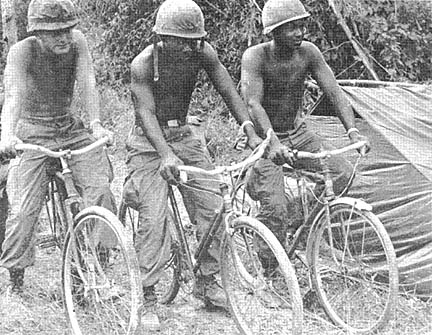 |
MECHANIZED INFANTRY - Men from Co A, 2d Bn, 14th Inf, pose with Viet Cong bicycles captured during a recent sweep in the HoBo Woods. The bikes were given to needy Vietnamese families in the Cu Chi area. (Photo by SP4 Bill Wermine) |
Page 4-5 TROPIC LIGHTNING NEWS October 23, 1967
 |
| HELICOPTERS DROP TOWARD LANDING ZONE IN HOBO WOODS UNDER COVER OF SMOKE SCREEN. (PHOTO BY SP5 TERRY RICHARD) |
Infantry, Engineers Team Up In HoBo Woods
Infantrymen and engineers of the 25th Div are sweeping through the HoBo
Woods northwest of Saigon, destroying a 30-year-old Viet Cong sanctuary. Two thousand troops of the 1st Bde began the massive search and destroy
operation Sept. 17 in the Viet tong stronghold, 55 kms from Saigon.
Rome Plows are following close behind the infantrymen leveling portions of
the jungle at the rate of 250 acres per day. To date, searchers have found and destroyed four large base camps, more than
five miles of tunneling, and hundreds of individual weapons, 25,000 rounds of
ammunition, and 69,000 pounds of rice.
|
|||
| BRIDGE SPANS WERE FLOWN INTO THE 25TH DIV’S OPERATIONAL AREA IN THE HOBO WOODS. A HOOKUP MAN SNAGS CARGO HOOK; BRIDGE SECTION IS AIRBORNE; BRIDGE CREW GUIDES SPAN INTO POSITION. (PHOTOS BY SP5 TERRY RICHARD) |
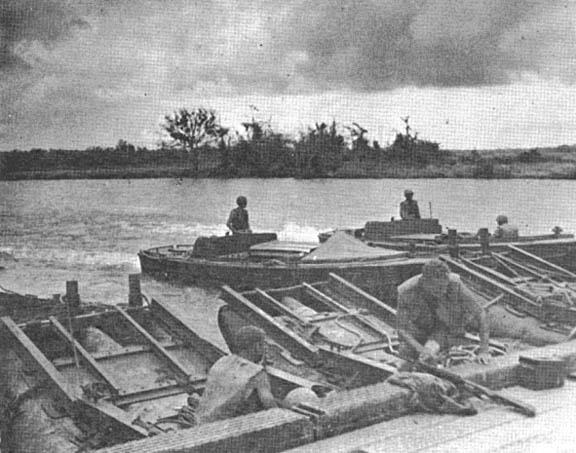 |
65TH ENGR BN POWER BOATS PUSH RAFT UPSTREAM. (PHOTO BY SP4 JIM O’NEILL) |
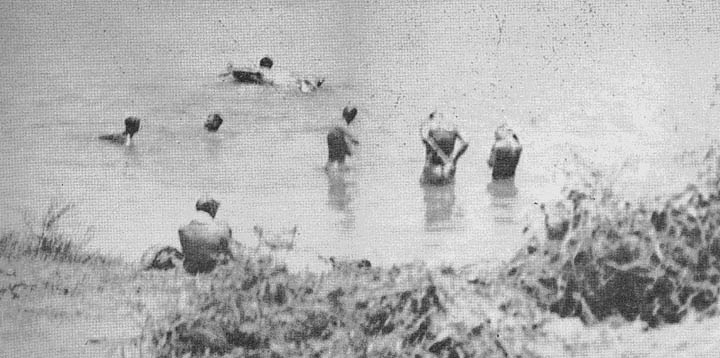 |
| SOLDIERS OF THE 65TH ENGR BN TAKE A REFRESHING BATH AFTER A HARD DAY’S WORK. (PHOTO BY PFC GEORGE POLLEN) |
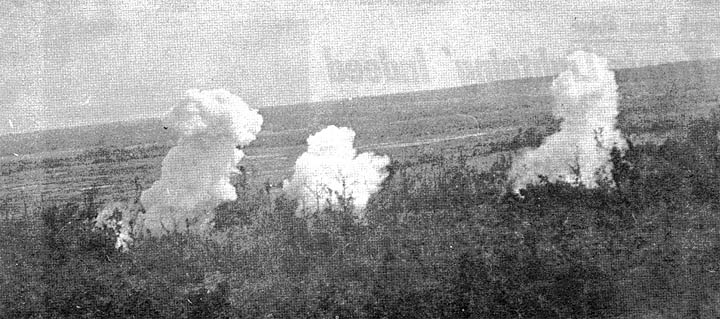 |
| ARTILLERY SHELLS POUND VIET CONG POSITIONS IN THE HOBO WOODS, 55 KMS NORTHWEST OF SAIGON. (PHOTO BY SP4 BILL WERMINE) |
| A TANK CROSSES BRIDGE SPAN. (PHOTO BY PFC GEORGE PULLEN) |
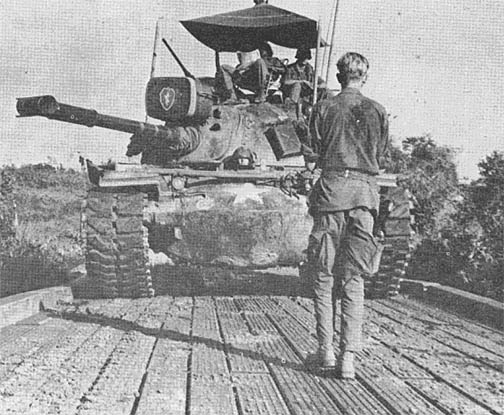 |
Page 6 TROPIC LIGHTNING NEWS October 23, 1967
Struck From Above
’Tropic Lightning’ Indeed
Lightning struck twice in a 25th Inf Div forward base camp recently, giving
two sergeants some shocking combat stories to tell.
Men of the 1st Bn (Mech), 5th Inf, started tightening tent ropes and covering
supplies as monsoon storm clouds rolled over their camp. Medics in the “Big Angel,” the battalion aid personnel carrier, lowered their
tent flaps to sit out the rain.
“We were all sitting around,” explained CPT Edward DeHass, battalion surgeon
from Toledo, Ohio, “when all of a sudden, ZAP! The next thing anyone knew we
were all lying on the floor.”
Seconds later a soldier ran into the aid station shouting, “Hurry, a man’s
been hit by lightning at the command post.”
“Evidently the guy didn’t think it odd that we were all laying on our backs
with dazed looks on our faces,” said SFC Arlie Wolfrum, the medical platoon
sergeant from San Antonio, Tex.
“I managed to pick myself up and hobble over to the command post,” he
explained. There he found a radio operator, SSG Steve Riga of Portsmouth, Ark.,
sitting on the floor nursing a burned lip. Riga had been talking on the phone
when a ball of fire leaped off the set.
“I’ve been chewed out over the phone before, but this is the first time I’ve
been knocked out over it,” Rigajoked as Wolfrum treated the burn.
Not laughing, Wolfrum returned to his aid station to treat the others. “No
one was hurt seriously,” he said later, “but we do have some stories to tell
about lightning striking twice.”
He Hides in Homemade Headboard
American furniture manufacturers have built about everything imaginable into
the headboards of beds; radios, bookcases, storage shelves.
A Viet Cong guerrilla in Hau Nghia Province has gone them one better - he
built himself into the head of a bed.
As Alpha Co, 2d Bn, 27th Inf “Wolfhounds,” began sweeping through the village
of Lam Vo they spotted a man running behind a building.
A squad was sent to search the building. Inside they found a woman doing her
household chores who denied having seen anyone.
Just before leaving, the soldiers noticed what looked like a large box built
into the head of a bed.
Squeezed inside they found their man. He immediately admitted being a Viet
Cong local force guerrilla and asked to rally under the “Chieu Hoi” program.
Today the former VC is working as a rallier with the 25th Inf Div trying to
convince his former friends that no matter where they hide, they can’t escape
the allied forces.
| WEIGHTED DOWN - A member of the 2d Bn, 27th Inf “Wolfhounds,” lugs a 90mm recoilless rifle through high grass during Operation “Kolekole.” (Photo by SP4 Joe Carey) |
 |
Cong’s Own Punjii Stake Is Fine Probe
Some Viet Cong would probably feel very sheepish if he knew how his
woodworking skill led U.S. infantrymen to the capture of some very valuable
weapons and equipment.
PFC Lonnie J. Robbins of Caryville, Tenn., and other members of Co C, 2d Bn,
14th Inf, were detailed to get poles in order to search the brush along the
Saigon River during a search and destroy operation.
Robbins chose a pole that had been a VC punji stake. “It had a sharp point
on the end that looked as if care had been taken to carve it,” said Robbins.
As they probed in the heavy brush along the river, Robbins poked his pole
into a plastic covered and camouflaged 55-gallon drum. In the drum was a
complete 60mm mortar, tools, cleaning equipment, grease, a Chinese claymore and
many documents. A company spokesman mentioned the mortar is going to be put
back in use but this time on the side of the allies.
Robbins said, “Everybody was happy about the find, it really hurt the VC.”
Arty Support Base Blasted By Enemy
During a recent attack by VC on the 3d Bn, 13th Arty, RPG-2 rockets and 82mm
mortars pounded the area wounding 21 artillerymen. The cannoneers of the
general support unit blasted the Viet Cong position with direct counter mortar
fire resulting in an unknown number of enemy casualties.
Bravo and Charlie batteries supported by the battalion headquarters were at a
fire support base in the vicinity of Trung Lap when an unusually heavy call for
artillery depleted ammunition stores. A night resupply was requested and the
242d Hel Aslt Spt Co responded.
SP4 John C. Baker of Bravo Btry, was manning a perimeter defense bunker when
the Chinooks arrived with 155mm shells and powder. Baker, from Hamilton, Ohio,
recalls, “Two Chinooks had already dropped their cargo and the third was just
setting down with a load of high explosive shells when a sharp crack stunned
me.”
“There were more explosions behind me and I figured they had gotten the
chopper.” He continued, “as my head cleared I saw muzzle flashes from the tree
line so I started firing my M79 as fast as I could.”
What Baker didn’t know was that an RPG-2 rocket had scored a direct hit on
the top of his bunker ripping through the layer of sandbags and tearing a three
foot hole through the steel plates on the roof.
“I’m glad I couldn’t see that hole in the dark. I probably would have passed
out,” Baker said with a smile the next day.
The CH-47 received ten hits but did not fall. The crew managed to regain
altitude and fly the crippled ship back to Cu Chi where the pilot was treated
for minor shrapnel wounds.
With mortars still smashing into the battalion area the four available medics
worked feverishly to bandage the wounded.
PFC Ronald E. Byrd, Bravo Btry medic from Humbolt, Tenn., headed for the
perimeter but never reached it.
“I heard guys yelling for a medic by the Fire Direction Center so I turned
and went back. When I got there the sergeant major and several others were
wounded,” said Byrd.
Byrd finished caring for the wounded and was organizing medical evacuation
when shouts for a medic came from the direction of the mess truck.
As Byrd was running towards the truck he was knocked down by a mortar round
blast.
“I felt something like a needle hit my thigh but all I could think of was
getting to the guys calling for me,” recalled Byrd.
Although wounded, Byrd continued aiding the wounded until he was evacuated by
helicopter.
As the artillerymen started cleaning up and bracing themselves for another
possible attack their hearts and thoughts were of the four medics and their
valiant efforts to treat the wounded cannoneers, who all survived.
Maybe Saving For A VC Paper Drive
Two men of the 4th Bn, 9th Inf, already know the news for Nov. 21 - for the
year 1940 that is.
PFC Jesus Chavez of Sacramento, Calif., and Kevin B. Sullivan of East
Hartford, Conn., were with Bravo Co in a 25th Div operation in the HoBo Woods,
assigned to an observation post.
“When Sullivan and I went out to the OP, we saw a hooch about 50 meters to
our front,” Chavez explained. “We checked it out and found a small stack of
newspapers in one corner.
“You could just about make out the print of the top paper after we brushed
the dirt and cobwebs off the stack. It was from Oakland, Calif., and the date
was Nov. 21, 1940,” he added.
Page 7 TROPIC LIGHTNING NEWS October 23, 1967
Dog Is Bewildered During Memorial
Men of the 25th Inf Div’s 38th Scout Dog Plt gathered recently to pay tribute
to one of their members killed in action against the Viet Cong.
The saddest member of all of them never said a word, but glanced repeatedly
at the weapon and beret of his master.
Held at the 1st Bn, 27th Inf “Wolfhound’s” chapel, the service was in memory
of SP4 Bobby J. Shelton of Flagpond, Tenn., who was killed while on a search and
destroy operation deep in the HoBo Woods.”
“Paddy, his dog, took it hardest of all,” said Plt Leader First Lieutenant
John Anderson. “All morning he wandered around looking for him.”
Paddy was trained at Lackland Air Force Base in Texas, and was one of the
dogs to arrive with the unit in Vietnam in July of 1966. Paddy has been on
continuous combat operations with the 25th Div since that time.
Shelton was a product of the 38th Plt’s own training program given at the
unit’s Cu Chi base camp. The program accepts volunteers from within the
division and trains them to be combat dog handlers.
“Paddy will be retrained to another master,” says Anderson, “but it takes a
while to adapt to someone new.”
No Men Sure Sign
A recent helicopter combat assault by Co D, 4th Bn, 9th Inf, really paid
off. The targets were suspected Viet Cong medical resupply points located about
14 kms north of Trang Bang in Tay Ninh Province.
In one area they found a sure sign of VC activity - no men over 12. Several
tunnels were discovered after a false well bottom caved in. The tunnel system
built out of reinforced concrete, yielded several boxes of ammunition.
The next landing was half a mile further west. “It was the same story as
before,” said 25th Div Plt Leader 2LT Thomas Fisher of Glenshaw, Pa., “no man
over 12. Just women and children.
“As we entered the hamlet two young women made a dash for the woodline. Even
though the girls had a 75 meter head start on us, two of our men caught them
after a 700 meter chase. When they were caught, one of the girls was attempting
to jam some papers into a hole in the dike.
“Neither of the girls had an ID card, and the papers turned out to be a wad
of money - around 10,000 piasters! Some local VC probably won’t get paid this
month,” Fisher concluded.
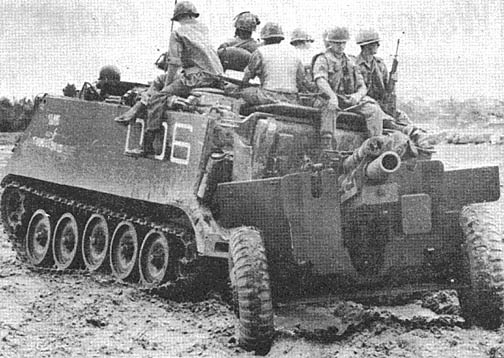 |
ALL ABOARD - Hauling its own firepower, an armored carrier of the 1st Bn (Mech), 5th Inf, moves out on the 25th Div Operation “Kolekole.” (Photo by SGT Roger Smith) |
Carelessness Kills Guerrilla In HoBo Woods
Four Viet Cong wandered too close to the 4th Bn, 9th Inf, lines in the HoBo
Woods and one paid for his carelessness with his weapon and his life.
The guerrillas apparently thought they were far from enemy lines for they
strolled unconcerned down a trail to within 10 feet of the company’s perimeter.
At the cry of “Halt!” the startled Viet Cong tossed two grenades wildly and
ran.
“I heard the grenades and then saw this Charlie run right in front of me,”
said PFC Freddy B. Harmon of Olney, Ill. “I fired three rounds at him, he ran
about 10 meters and fell.”
The 25th Div soldier retrieved a Russian AK-47 from the body.
This Weapon He Can Keep
SSG Donald Glover of Dunn, N.C., finally has found a weapon he can keep.
In August, during a 2d Bn, 14th Inf, river assault Glover uncovered two
weapons - a Chinese Communist machine gun and an automatic carbine. Because
they were automatic he had to turn them in.
On Sept. 21, as his platoon was moving along a trail, Glover spotted the
stock of a Chicom carbine sticking only a few inches out of the ground near a
bomb crater.
“The weapon was in beautiful shape,” said Glover. “It meant a lot finally to
be able to claim one.”
Not Always A Foot Soldier
“I always thought the infantry was a foot outfit but I’ve found out that it
has a little Air Force and Navy mixed in too,” commented a 25th Inf Div soldier
after a recent operation.
First call for the 1st Bn (Mech), 5th Inf, came in the brisk dark hours of
early morning. The sleepy-eyed men dragged themselves out of the sack, shaved,
and ate chow under the stars. At 4 a.m. the order was given to move out.
Heavily loaded with extra ammunition, C-rations and weapons, the 1st Plt of
Charlie Co left their night perimeter and began the long trek to the Oriental
River.
Their mission was to set up a blocking force for the 27th inf which was
conducting a sweep on the far bank.
Mid-morning, and the troops were in position keeping an eye on the river for
Viet Cong attempting to swim to safety.
Just before noon a mammoth CH-47 “Chinook” helicopter carrying a large
engineer assault boat slung beneath it hovered over the water in front of the
platoon and landed its load.
Ten platoon members were added to the boat’s three man crew and for the rest
of the day the tiny group of “sailors” patrolled the river banks.
As the operation came to a close the Chinook returned and flew boat and crew
to the Div’s Cu Chi base camp.
That evening, the infantrymen mounted their armored personnel carriers and
returned to the battalion’s forward base.
“It was quite a day,” said platoon leader 2LT Mickey Miller of San Diego,
Calif.
Mess Sergeants’ Rank Upgraded
The upgrading of ranks for mess sergeants and first cooks has been announced
by the Department of the Army in a circular which reached the field last month.
Effective Oct. 1, company-level or team mess sergeants are authorized the top
grade of E-7. At the same time it was announced that authorized slots for first
cooks have been upgraded to SSG E-6.
|
THE 25th INFANTRY DIVISION
Now Available to all Servicemen, Their Families and Friends.
Since October 1966, the “Tropic Lightning” Division has held four full-scale
operations and participated in hundreds of smaller missions. Throughout the Boi
Loi and Ho Bo Woods, the Michelin and Filhol Plantations, and the many nameless
but not forgotten swamps and rice paddies of Vietnam, the 25th Infantry Division
has compiled an impressive record of military and civic action achievements. |
Page 8 TROPIC LIGHTNING NEWS October 23, 1967
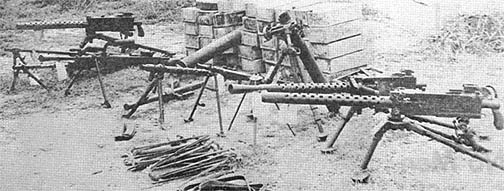 |
| WEAPONS CACHE - This weapons cache was uncovered by Rome Plows of the 27th Land Clearing Team, which is working with elements of the 25th Inf Div in the HoBo Woods. (Photo by SP4 Hugh Wyatt) |
Weapons, Clothing Caches Uncovered In HoBo
A quantity of weapons and ammunition critically needed by the Viet Cong, has
been uncovered in the HoBo Woods by elements of the 25th Div. A Rome Plow from the 27th Land Clearing Team uncovered a tunnel containing a
cache of large caliber weapons and munitions. Tunnel rats from the 2d Bn, 14th Inf, found three mortars, a Chinese and two
World War II Japanese machine guns, four French submachine guns, two Chinese
rifles and three .30 cal. machine guns.
Also found were 4,100 rounds of .50 cal. ammunition, 43 rounds of 75mm
recoilless rifle ammunition and 10 Chinese claymore mines. Some 50 meters from the tunnel, searchers found a second cache containing 400
pounds of clothing and uniforms.
The plows have been clearing portions of this former Viet Cong sanctuary at
the rate of 250 acres a day.
‘White Warriors’ Discover Large Base Camps, Bunkers
DAU TIENG - During a recent search and destroy mission southeast of the 3d
Bde., 25th Inf Div’s base camp at Dau Tieng the “White Warriors” of the 2d Bn,
12th Inf, uncovered a number of Viet Cong base camps.
The six day sweep under the command of LTC R. D. Tice, has deprived the local
VC forces in this area of their base of operation.
On the third day of the sweep Bravo Co uncovered the largest camp which
consisted of a total of ten buildings and a number of well constructed bunkers.
Situated in the buildings were a classroom, supply room, mess hall, workshop,
command post, club, and what looked to be a Viet Cong stockade. Found within
the buildings were documents of the National Liberation Front and other VC
propaganda.
The six-day sweep netted a total of over five tons of polished rice,
destruction of sixty-two bunkers and the freshly dug graves of eight VC.
French Sedan Found
1st Bde units have found all manner of unusual objects in the HoBo Woods -
cameras, printing presses and type for instance. But the latest find tops the
unique list.
On a search and destroy mission approximately 19 kms north of Cu Chi Bravo
Co, 4th Bn, 23d Inf, discovered a small trail that apparently reached a dead end
in heavy brush.
The undergrowth turned out to be camouflage though, and the hidden trail
continued to a bomb crater. Here the Tomahawks uncovered a small, light-green foreign sedan - a ‘58 or
‘59 Simea Aronde.
The interior was torn-up, and the body somewhat weatherbeaten, with bullet
holes in the roof and left-hand door. The hood was jammed shut and the motor could not be turned over, but there
was a smell of fresh gasoline in the area. All four tires were inflated.
A French-type license tag found on the car has been turned over to officials
in Saigon in an effort to trace the owner.
Squad Leader Trips VC Trap
More than one hundred men had already safely filed down a narrow jungle trail
when a 25th Inf Div soldier detonated a Viet Cong boobytrap.
SGT Bobby L. Mitchell, a squad leader with the 2d Bn, 27th Inf “Wolfhounds,”
was taking part in a search operation when his company began moving down the
trail.
Near the end of the column, Mitchell’s foot tripped the VC trap and the mud
beneath him erupted.
“I really didn’t know what happened,” he explained later, “I knew I had hit a
boobytrap, but I felt all right.”
The explosive device had detonated with only a fraction of its full power.
| UNPACK - SP4 David Hargrove and CPT Ellen Langston unpack several boxes of clothing donated to the Vietnamese by residents of Richmond, Calif. (Photo by SP4 John Seymour) |
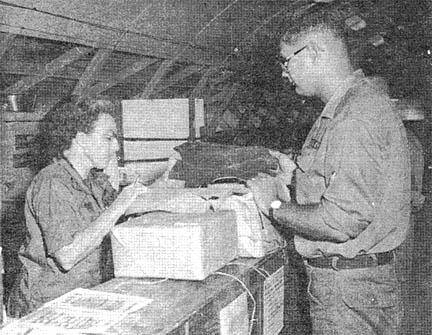 |
Thanks to:
Jim Reynolds, 125th Signal Battalion,
for sharing this issue,
Kirk Ramsey, 2nd Bn., 14th Inf. for creating this page.
This page last modified 05-09-2006
©2006 25th Infantry Division Association. All rights reserved.